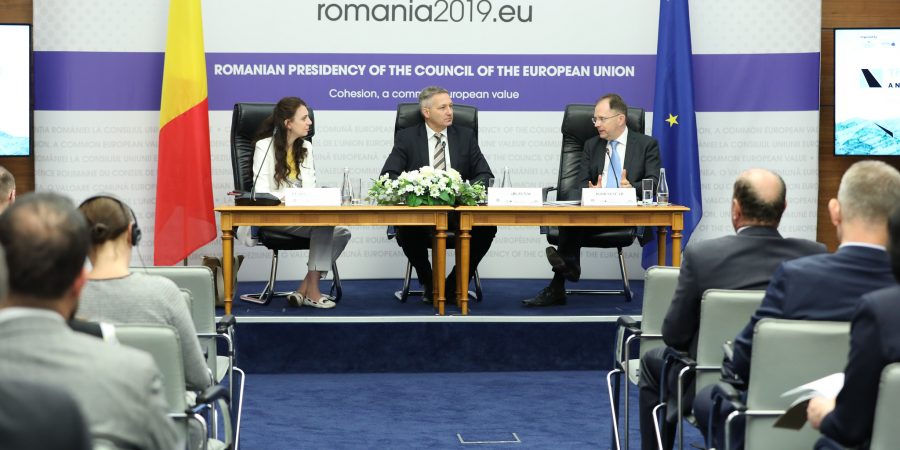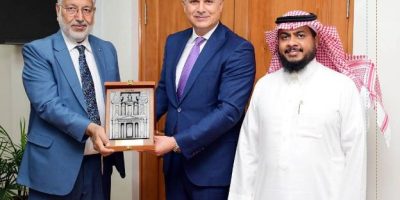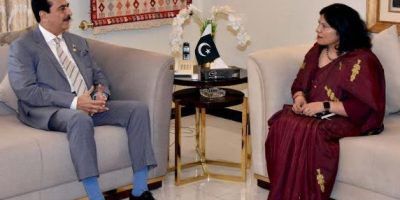Many milestones achieved during Romanian EU Council presidency

Romanian EU Council Presidency
DNA REPORT
On 1st of January 2019, Romania took the helm of the rotating EU Presidency, for the first time since joining the union, in 2007.Brexit and the defence of EU citizens’ interests and cyber security threats, as well as the future enlargement policy in Western Balkans were among the top level priorities of this Presidency. The role played by the Romanian Presidency in securing free and transparent European elections in May this year, will have an impact not only on the configuration of the European Parliament, but also that of the European Commission and subsequently will influence the future of the EU and its policies.
As expected, Romania has gone through a very intense and challenging period these months, bearing in mind the complex context inside and outside EU and the demanding European agenda.
Nevertheless, the results Bucharest can present today after exercising the Presidency are strong arguments that point to Romania’s efforts, dedication and capacity to bring the various files forward, together with all the other Member States.
For a general overview, during its Presidency, Romania handled thousands of events and meetings: out of which hundreds working group meetings (in Brussels), more than 200 trilogues with the European Parliament and the European Commission on the legislative proposals in co-decision.
Moreover, tens of ministerial meetings, both formal and informal, in Brussels and Bucharest have been organized under the auspices of the Romanian Presidency of the Council of the EU, and Romania have ensured the representation of the Council of the EU in the European Parliament plenary sessions.
Romania’s efforts as Presidency of the EU Council translated in substantial results of the negotiations regarding thelegislative files. Thus, Bucharestsucceeded to finalise the negotiations on an important number of legislative files.
At the same time, a significant part of the activity of the Presidency is also dedicated to the non-legislative dimension, namely discussion on political files, drafting the Council Conclusions on various topic of common interest and preparing the EU position within various international fora. On this side, Romania has conducted the negotiation and adoption of a significant number of Council Conclusions on different topics of interest at the Member States level.
Among the most important legislative and non-legislative files concluded, we can mention: the Natural Gas Directive, the Directive on copyright in the Digital Single Market; the Regulation establishing European Labour Authority, the Consumers Package, the Regulations Package on interoperability of the informatic systems of the EU; the legislative proposal regarding the consolidation of European Border and Coast Guard Agency, the Banking Package, the legislative package on Capital Markets Union, amending the Regulation on the status and financing of European political parties and foundations; Council Conclusions on securing free and fair elections, with a focus on countering disinformation, Council Conclusions on artificial intelligence, Council Conclusions on 2030 Agenda.
Despite the limited legislative window due to European elections held in May 2019 and the different, sometimes even divergent, interests of the Member States, the Romanian Presidency has managed to conclude work on a number of key policy areas that can deliver real benefits for Europe’s citizens. This performance has been acknowledged both by the Member States and by the representatives of the European institutions.
EUROPEAN ELECTIONS
From the first days of the European mandate, it was the main priority and responsibility as Presidency of the Council of the European Union to work towards securing a proper regulatory framework that enabled free, transparent and democratic elections. Romania’s Presidency of the EU Council has managed to foster concrete actions in order to ensure free and fair European elections, and, in the longer term, to enhance cooperation and preparedness for more comprehensive actions against disinformation.
Indeed, the elections held in May 2019 are truly crucial for the future of the European Union. The results of the elections registered within the Member States have an impact not only on the configuration of the European Parliament, but also that of the European Commission and subsequently will influence the future of the EU and its policies.
While this is undoubtedly a common feature of the European elections, given the rise of Eurosceptic, populist and extremist tendencies and narratives, it is clear that actions should be taken to better build the Continent’s discourse based on the undeniable added-value of the European integration project and to follow a positive, consensual and result-oriented agenda.
Voter’s mobilization was also crucial and the substantial increase of the participation to the polls was a real success. Though the EP has gradually attained more competences in the EU institutional framework, none of the improvements could stop so far a decline in voters’ turnout. At this point of time, in the context of Brexit and after a series of crisis the EU faced, thepositive outcome of the voter’s turnout has reversed a recent negative trend and substantially exceeded the turnout of 2014. Getting people, the European citizen vote in the EP elections had been a major political objective because of the importance of being able to diminish the impact of the Eurosceptic voices in the future European Parliament.
The European Parliament should be in the future a strong institutional partner of the Council and should continue to advocate for the consolidation of the European Union. The political mandate for this to happen should come from the EU elections and the new Parliament will take this task very seriously.
MULTI-SPEED VISIONS DEBATES
The debate on multi-speed visions, Europe à la carte etc. are part of the debate on the European future. The idea of a number of closer groups on some areas of further integration might seem practical, even natural. However, these multiple speeds or core groups should be considered only in thematic terms and levels of commitment – not exclusionary, not à la carte. There should be no peripheries in the Europe Union, if Europe is to remain the united Europe Romania knows and have joined.
It is essential to use variable speeds scenarios and flexibility with great caution, as they could fuel the logic of “core vs. periphery”. The EU should aim for as much unity as possible and as much flexibility as strictly necessary to fulfil the objectives that are common for all Member States. The only future Romania can envisage, therefore, for the European Union, is the one built on these values.
CYBER SECURITY
When it comes to the concept of security, European Union developed a wide range of concrete measures to further strengthen the EU’s cyber security structures and capabilities with more cooperation between the Member States and the different EU structures concerned. When setting out, at the beginning of January 2019, Romania’s 6-monthly program for EU Council Presidency, cyber security have been identified among the top priorities.
Building security in cyberspace requires full implementation of the EU Cyber Diplomacy Toolbox and Romania worked hard to finalize under the RO Presidency to EU Council the EU cyber sanctions regime, supporting cooperation between member states on attribution as well.
A common and comprehensive approach for cyber diplomacy will contribute to the “mitigation of cybersecurity threats, conflict prevention and greater stability in international relations through the use of diplomatic and legal instruments.Romania underlines also the key importance of increasing the EU capacity to deter and to respond to cyber-attacks in view of securing the future European electoral processes.
EU ENLARGEMENT PROCESS
Romania strongly supports the EU Enlargement Process, a driving force of democratic change that brings stability and prosperity to our neighbourhood. Bucharest is committed to advance this dossier as one of Romania’s priorities as an EU Council Presidency. The perspective of EU membership has proven to have a great transformative effect on the region. The most visible is the example Skopje, which proves what a spectacular progress can be achieved when there is a strong commitment and political will to move in the right direction. Romania is strongly committed to continue to promote EU enlargement, clearly based on the principle of individual merits, as the main way to contribute to the stability and prosperity of the Western Balkans.
CONCLUSIONS:
The first Romanian Presidency of the Council of European Union took place against a backdrop of a large-scale development that will determine the next decades’ shape of the European Union: the reflection of the future of the Union; the United Kingdom’s process of leaving the EU; the transition towards a new legislative cycle as a result of May 2019 elections, and implicitly the end of the incumbent European Commission and European Parliament’s office. At the same time, challenges on the international scene deem necessary an active role of the European Union at the international stage.
In this context, a landmark for Romanian Presidency had been the Sibiu Informal Summit that took place on 9th of May, only two weeks before the European Elections. The Sibiu Summit was a great success as a crucial moment raising the awareness among the citizens about the added value generated by the EU as well as the message of unity sent by the EU leaders gathered in Romania.
Furthermore, the end of the current EU institutional cycle translated into a high number of pending files that reflects the key priorities for the future of the Union and its citizens. Romania has set high level of ambitions and has achieved very tangible results in these domain while remaining realistic about the complex context and the specific of this mandate. For this reason in the first half of its term, Romania’s Presidency had focused its efforts on advancing with the legislative process and finalized a very significant number of files and in the second part on the non-legislative files equally important and complex.
The Union of the future needs a solid and appropriate framework and resources and Romania’s Presidency has acted for vigorously advancing the negotiations for the multiannual budget for getting results equally balanced and well calibrated to the realities that the European citizens perceive day by day. At this stage, due to Bucharest efforts, the new presidency will have a very well prepared ground for rapidly advancing and approving the Multiannual Financial Framework.
Promoting cohesion of political action, cohesion of economic dimension, as well as social cohesion required Bucharest to focus on four main pillars:
- Europe of convergence;
- A safer Europe;
- Europe, a stronger global actor;
- Europe of common values.
In keeping with the above mentioned ambitious goals, the calendar of the Romanian Presidency of the Council of the European Council comprised a significant number of meetings and events, both at high level and at technical level that took place in particular in Brussels, Luxembourg, Strasbourg and Bucharest.
During its six-month mandate as the rotating Presidency of the EU Council, Romania deployed considerable efforts both in terms of the substantive matters, which are of high complexity, and in terms of logistic, which implies extensive preparation process and required the mobilization of the entire Romanian public administration and society.
Through its work and actions as the President of the European Union Council, Romania has greatly contributed to the advancement of the European construction process, based on the consolidation of the European cohesion and unity thus adding a new page in the overall European Union evolution.
Related News

IIUI, Jordan aim for stronger university partnerships
ISLAMABAD, JUL 23 (DNA): Dr. Maen Khreasat, Ambassador of the Hashemite Kingdom of Jordan toRead More

Nepal Ambassador calls on Chairman Senate Syed Yousuf Raza Gilani
ISLAMABAD, JUL 23 /DNA/ – Chairman Senate Syed Yousuf Raza Gilani has said that PakistanRead More


Comments are Closed